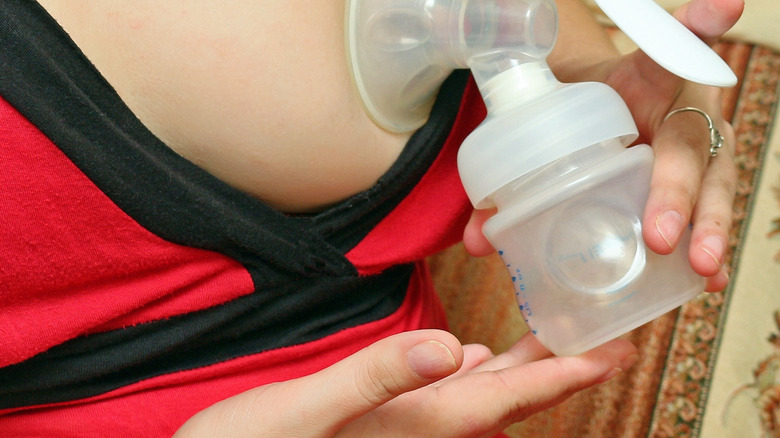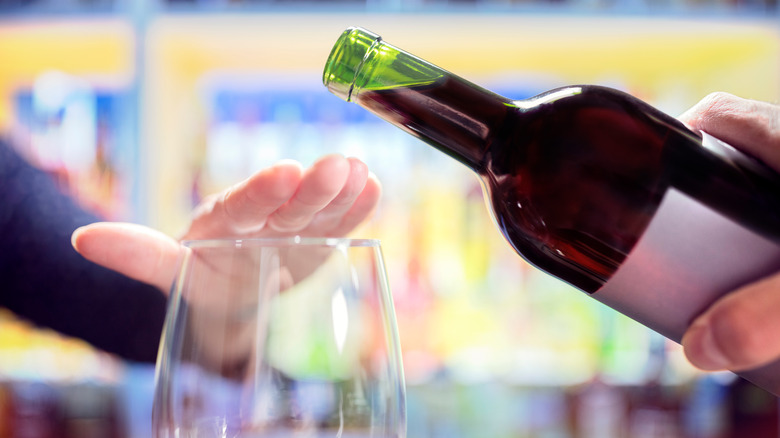Is It Safe To Drink Wine When You're Breastfeeding?
Cheers! You've made it through nine months without a drop of alcohol. Your baby is here, and she's healthy. That's a reason to celebrate with a glass of wine, right? Oh, but wait, you're breastfeeding. Is it safe to imbibe?
We know that abstaining from alcohol during pregnancy is critical to your baby's health and development in the womb. The research is clear about that. However, when it comes to whether drinking alcohol while breastfeeding is safe or not, there's a range of recommendations, depending on whom you ask. Some health care providers say the best course of action to take when you're breastfeeding is to abstain from alcohol altogether. At the opposite end are those who believe that beer increases milk supply (a myth). Still others, including the Centers for Disease Control (CDC), are in the middle. They say, yes — you can safely drink alcohol while breastfeeding, but there are a few important caveats.
A drink a day is OK
According to the CDC, one standard drink a day is not known to be harmful to a nursing infant, particularly if you wait at least two hours after one drink before breastfeeding. You probably have some questions, such as how much is a "standard" drink? And why do I have to wait those two hours?
A standard drink is 5 ounces of 12% wine, 12 ounces of 5% beer, 8 ounces of 7% malt liquor, or 1.5 ounces of 80 proof liquor. Be careful to check bottles and cans for alcohol content. If you accidentally drink a glass of beer that's 9% alcohol, you'll be imbibing nearly double the amount of alcohol as a regular beer.
When you drink alcohol, it enters your bloodstream and passes easily into your breast milk. The level of alcohol in your blood and breast milk are similar and reach peak concentration between 30 and 60 minutes after a drink (per Contemporary Ob/Gyn). However, alcohol can be detected in breast milk for about two to three hours altogether. Having more than one drink increases the length of time alcohol is present in breast milk — four to five hours for two drinks, and six to eight hours for three.
Wait two hours after imbibing
It's recommended you wait at least two hours after having one drink before you nurse again to be sure you're not passing alcohol to your baby.
However, there's no need to pump breast milk and dispose of it to be sure it's free of alcohol before you nurse, says the CDC. Doing so does not remove alcohol from your milk more quickly. The amount of alcohol in your breast milk mirrors the amount in your bloodstream, and as the alcohol is metabolized (a chemical reaction in the body that processes food and changes it into energy) it is broken down in your blood and breast milk, decreasing its level over time. In general, the metabolism of alcohol takes up to three hours for one drink, although it can vary based on how fast the drink was downed, whether it was consumed with food, how much you weigh, and the exact speed of your metabolism. Waiting two hours before you resume nursing is sufficient.
If you're missing a scheduled feeding during those two to three hours or the buildup of milk in your breasts is causing pain and discomfort, you may decide to pump and dump.
Resist the temptation to down more
Sticking to one standard drink a day is fine while breastfeeding, but if you're tempted to have more than that, remember that alcohol and a nursing baby don't mix well. Alcohol not only has short-term effects on your infant — and on your ability to nurse — but may have long-term effects as well.
Studies have shown that when women consumed alcohol prior to breastfeeding, their babies drank 20% less milk in the first four hours than babies whose moms didn't consume alcohol (via Contemporary Ob/Gyn). And a baby's sleeping patterns may be affected as well. Two studies found that infants' sleep was more fragmented after having breast milk containing alcohol, while another study showed the overall duration of sleep was reduced by about 25%.
Long-term effects haven't been as researched, but one study found that toddlers exposed regularly to breast milk containing alcohol scored significantly lower on motor development than control infants.
Too much alcohol can also interfere with your let-down response and, over time, can lead to decreased milk production. And, of course, having too much to drink at one time can affect how you care for your baby.




